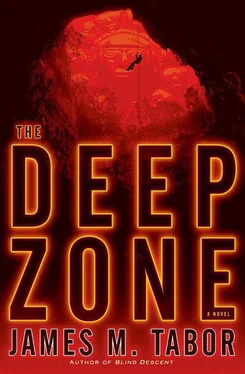They sat on nearby rocks and turned off their lights to conserve batteries.
Before long, Al Cahner spoke, his voice tense: “I hope to God that young man is all right. He’s a bit rough around the edges, but really quite likable.”
“Haight’s dived some of the toughest caves in the country,” Hallie pointed out. “My guess is he’s just taking his time, having fun with a new toy, his rebreather.”
No one spoke for a while. Hallie took a Snickers bar from a pocket of her caving suit, unwrapped it, and broke it into three pieces. Without turning on her light, she stood and walked to where Arguello was sitting. She moved lightly, the sound of wind and flowing water covering her footsteps.
“Have some chocolate, Rafael.”
“Jesus.” Arguello, startled, jumped off his rock seat. “Where did you come from?”
She moved on to Cahner, handed him a piece, and returned to her own place.
“How did you do that?” Arguello asked the question through a mouthful of Snickers.
“I learned it from other cavers a long time ago. You should, too. Before you turn off your light, make a mental snapshot of your surroundings. It’s hard at first, but gets to be second nature after a while. You’d be amazed at how much detail you can retain with practice.”
“I will try to learn how to do that myself.”
“It’s a necessary skill down here,” Cahner said.
Then they were quiet. Hallie listened to the sound of air moving through the cave, and to flowing water, and she felt the cave enveloping them. Most people thought caves were dead and silent places, she knew, but they were rarely silent and never dead. Life thrived in every cave, often weird life, it was true, but weirdness was really in the eye of the beholder.
And then, almost as if he had been reading her mind, Arguello spoke:
“I was telling you earlier that many native peoples believe caves are alive.”
“Tell me—tell us —more,” Cahner said.
“I am pleased by your interest. Many scientists are quick to dismiss such things.”
“These people and their beliefs have survived for thousands of years. That says something,” Cahner pointed out.
“Indeed. So, the Cuicatecs say that caves breathe, which we know they do. They have circulatory systems, which is also true. Ours have blood in them; caves’ systems have mineral-rich water.”
Arguello paused to chew a bit of candy bar, then continued: “There’s more. According to Cuicatec beliefs, caves eat and excrete—two more of science’s criteria for classifying something as a living organism.”
“I’m not sure I get those,” Cahner said.
“Think of the earth as a big apple and a cave as a worm eating tunnels through it. And caves do have excretory systems—the rivers that flush waste from them. And they can heal themselves when injured.”
Cahner nodded. “All true, when you really think about it.”
Hallie had a question of her own. “So those are all the physical characteristics, Rafael. What about the other? The spirit? The thing they call Chi Con Gui-Jao.”
“The Cuicatecs believe that the first people were born out of this cave into the light. This cave and a few others. As we saw, they made sacrifices to appease the spirits that live here. For many centuries, also, they buried their dead here, because they felt it brought them closer to the gods who inhabit the cave.”
“You said gods , plural,” Hallie noted. “So it’s not just Chi Con Gui-Jao?”
“Oh, no. There are others. Chi Con is like Zeus in the other myths, the god of all gods. But many others exist, some good, some bad. For the ancients who inhabited this region, the cave was like our heaven—but also like our hell.”
“So you had demons and angels all living down here together?”
“That is right. In perfect balance. And only the curanderos could summon them. But not every curandero could summon every god.”
“You lost me,” Cahner said.
“Like our white magic and black magic. Some curanderos could invoke beneficent gods to heal the sick, ensure good crops, bless a marriage. Others could bring up the, as we would say, demons. To curse enemies, defeat invaders, acquire power.”
Hallie had another question. “How were curanderos chosen?”
“Anyone who wished to follow the path of curandero first underwent a trial. Only those who passed could go on.”
“What was the trial?” Hallie asked.
“The aspirant was brought deep into a cave by the oldest curanderos . He was left alone. Finding his way out proved that he was chosen. Failing to do so proved he was not.”
“How did the curanderos get in and out? With torches, like you told us about the sacrifices?”
“They needed no torches,” Arguello said.
Hallie decided to let that pass for the moment. “So they went back in and brought him out after a certain time?”
“Oh, no. Those who failed remained in the cave forever. That was the trial.”
“Come on, Rafael,” Cahner said. “If they really did that, there wouldn’t have been any curanderos . Nobody could get out of a cave like this without light.”
“The ancient records abound with accounts of those who did exactly that,” Arguello said.
“Sure, but our ancient myths are full of stories about beings who could fly and throw lightning bolts and command the oceans. These things are myths, not to be taken literally.”
“The accounts I speak of are not myths, my friend. They are true statements.”
Cahner chuckled. “But how could you know that, Rafael? You’re talking about things that supposedly happened, what, hundreds or even thousands of years ago.”
“That’s true. But they also happen today.” No one spoke for a long moment. Then Arguello said, “They happen, my friends. Believe me. I have seen it.”
Hallie remembered Lathrop saying that Arguello had undergone shamanic training himself. She and Cahner spoke at the same time, both with the same words:
“What are you—”
Before they could finish, they heard Bowman break the water’s surface, back from his rescue dive. All three reached for their light switches.
At first, it appeared that Bowman was alone. But then he placed one arm on the rocky edge of the flooded tunnel, heaved with the other, and Ron Haight came into sight. The blond head flopped loosely, grotesquely, to one side. The faceplate of his diving mask was shattered. Through it, Hallie could see his dull, unfocused brown eyes.
The presence of death tripped a very deep switch in her brain. Later there would be time to cry, but now she needed to act. She, Cahner, and Arguello grabbed the body, hauled it out of the water, and laid it facedown on the cave floor. Hallie ripped off the dive mask, rolled Haight onto his side, cleared his airway with two fingers, then put him on his back and tilted his head to begin CPR.
She breathed and Cahner did chest compressions. Arguello stood to one side, horrified.
Bowman joined her on the body’s other side and they performed CPR as a team, taking turns. After ten minutes, Bowman sat back on his heels. “Let’s call it. He’s not coming back.”
Cahner stood up. Hallie stayed on her knees, light-headed and dizzy from the hyperventilating. Through the mental haze she looked at Haight’s face, trying to imagine how this could have happened. And then, suddenly, Haight groaned.
“Madre de Dios!” Arguello and Cahner jumped. Hallie and Bowman did not.
“Residual air in his lungs,” she said. “The muscles loosen up before they go into rigor, and it escapes.” She turned to Bowman. “What happened?”
“I found him about twenty feet beyond where the tunnel makes that sharp right-hand turn.”
Читать дальше












